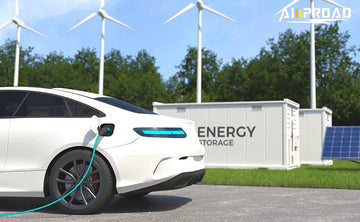
As electric vehicles (EVs) become an integral part of modern transportation, businesses are increasingly recognizing the value of installing commercial EV charging stations. A well-planned approach ensures your investment meets user demands and aligns with industry standards. Here's your complete guide.
What Sets Commercial EV Charging Stations Apart from Home Chargers?
Before diving into the buying process, it's essential to understand how commercial EV charging stations (EVCS) differ from home EV chargers. These distinctions are pivotal in making the right choice for your needs.
Commercial EVCS provide higher power outputs, such as Level 2 charger and DC fast charger, to accommodate quicker charging and support multiple vehicles. Unlike home EV chargers, commercial models integrate robust network connectivity, enabling remote monitoring, maintenance, and user payments. Payment options often include mobile apps, RFID cards, and credit card processing, catering to diverse user preferences. Durability is another factor—commercial chargers are designed to endure heavy usage and harsh outdoor conditions.
Suppliers like AMPROAD, a professional provider of Level 2 EV chargers with solutions offering up to 80A charging capacity, are known for their advanced technology and reliability. Understanding these differences will help you align your investment with your business objectives.
What Are the Key Features to Look for in a Commercial EVCS?
Choosing the right EV charging station begins with identifying the essential features that cater to your customer base and location. Here’s what to consider:
- Power Output: A Level 2 EV charger delivers 240 volts, significantly reducing charging time compared to standard outlets. For higher efficiency, DC fast chargers are ideal for rapid charging.
- Multiple Charging Ports: Look for models that support simultaneous charging of multiple vehicles to maximize usage and revenue.
- Network Connectivity: Stations with integrated connectivity offer remote monitoring, maintenance alerts, and software updates, improving operational efficiency.
- Payment Processing: Ensure the station supports various payment methods to enhance user convenience.
- Weatherproofing and Durability: Stations must withstand extreme weather and frequent use.
- Security Features: Protect your investment with tamper-proof designs and user authentication options.
How Do You Assess Your Business Needs for EV Charging Stations?
To select the ideal EVCS, start by evaluating your business and location requirements.
Determine the volume of expected users and their charging habits. For high-traffic areas, consider Level 2 chargers or DC fast chargers for quicker turnaround. Assess your site's electrical infrastructure to ensure compatibility with the power demands of commercial chargers. Locations like office parks or shopping centers may benefit from networked chargers that support user payments and data tracking.
Compliance with local zoning and permitting regulations is also crucial. Collaborate with an experienced supplier like AMPROAD to streamline this process. Their expertise in high-performance chargers ensures your installation meets regulatory and operational standards.
Which Supplier Should You Choose for a Commercial EVCS?
The supplier you select will impact the quality, support, and longevity of your EVCS. Focus on manufacturers with a strong track record in the EV industry. Look for features like comprehensive warranties, technical support, and scalable solutions. Suppliers such as AMPROAD provide advanced Level 2 electric car charger, up to 80A capacity, and a range of options for various commercial applications. Their emphasis on quality and innovation ensures your station meets current and future needs.
What Are the Steps to Install a Commercial EV Charging Station?
The installation process requires careful planning and execution. Follow these steps for a successful setup:
- Obtain Permits and Approvals: Consult local authorities to meet zoning laws and electrical codes. A qualified electrician can guide this process.
- Site Preparation: Assess the layout to determine optimal placement for user accessibility and power connection.
- Installation: Hire certified professionals to install the chargers, ensuring compliance with safety standards. Consider cable lengths and visibility for ease of use.
- Activate and Test the System: Networked chargers require configuration for features like payment processing and user authentication. Test the system to ensure seamless operation.
How Do You Maintain and Monitor EVCS for Long-Term Performance?
Regular maintenance is vital for the reliability of commercial EV charging stations. Establish a routine inspection schedule to identify potential issues early. Networked chargers allow for real-time monitoring of usage patterns, helping you adjust pricing or operational hours as needed. Partner with suppliers like AMPROAD, who offer reliable post-installation support to keep your chargers running efficiently.
Why Is Investing in Commercial EVCS a Strategic Decision?
Beyond catering to growing EV adoption, commercial EVCS provide businesses with multiple benefits. Enhanced customer satisfaction, increased foot traffic, and contributions to sustainability goals are just a few examples. As the market evolves, advanced options like AMPROAD’s Level 2 chargers ensure your business stays ahead in providing seamless and reliable charging solutions.
Ultimately, investing in a commercial EV charging station requires thoughtful planning, from understanding essential features to selecting a reliable supplier. By assessing your business needs and working with industry leaders like AMPROAD, you can make informed decisions that benefit both your business and the growing community of EV drivers. With the right EVCS, you’re not just powering vehicles—you’re fueling the transition to a greener future.


